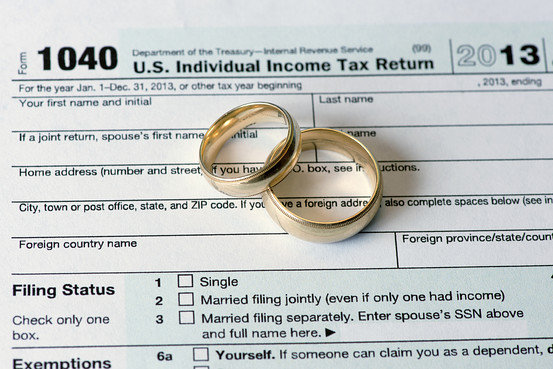What Is Married Filing Jointly?
Hitched documenting together is a recording status for wedded couples who have marry before the finish of the fiscal year. While documenting charges under wedded recording mutually status, a wedded couple can record their separate earnings, derivations, credits, and exceptions on a similar government form.
Hitched documenting mutually is in many cases the most ideal decision when just a single companion has a huge pay. In any case, assuming the two companions work and the pay and organized derivations are enormous and exceptionally inconsistent, it very well might be more profitable to independently document.
Key Takeaways
• Hitched documenting mutually is a personal duty recording status accessible to any couple who has marry as of Dec. 31 of the fiscal year.
• At the point when one life partner brings in essentially more cash than the other, it is much of the time the most ideal decision.
• It permits a couple to utilize just a single assessment form, however the two companions are similarly liable for the return and any expenses and punishments owed.
Should Married Taxpayers File Together?
Figuring out Married Filing Jointly
While utilizing wedded recording mutually documenting status, the two companions are similarly liable for the return and the assessments. Assuming that both of the mates downplays the charges due, both are similarly obligated for the punishments, except if the other life partner can demonstrate they knew nothing about the mix-up and didn’t profit from it.
Expenses can get pretty specialized and precarious, so in the event that a couple is experiencing difficulty deciding duty obligation they ought to converse with an accomplished assessment preparer.
Hitched Filing Jointly versus Documenting Separately
While utilizing wedded documenting together status, your complete consolidated charge risk is in many cases lower than the amount of your and your mate’s singular assessment liabilities assuming you were recording independently. The Internal Revenue Service (IRS) urges couples to record together by offering them different tax cuts that don’t have any significant bearing to the next documenting situations with.
Couples who document together fit the bill for different tax breaks, including the Earned Income Credit (EIC), the youngster and ward care credit, the American open door tax reduction (AOTC), the lifetime learning credit (LLC), and the saver’s duty credit.
Hitched couples recording mutually by and large approach more tax cuts.
A joint expense form will frequently give a greater duty discount or a lower charge obligation. Nonetheless, this isn’t generally the situation. A couple might need to examine their choices by computing the discount or funds to be paid while documenting mutually and independently. Then utilize the one that gives the greatest discount or the most reduced charge obligation.
Hitched Filing Jointly Requirements
You can utilize the wedded documenting mutually status if both of the accompanying assertions are valid:
You were hitched on the last day of the fiscal year. As such, on the off chance that you were hitched on Dec. 31, then you are considered to have been hitched throughout the year. On the off chance that you were unmarried, separated, or legitimately isolated (as indicated by state regulation) on Dec. 31, then you are thought of as unmarried for the year. There is a special case for this standard for the passing of a mate.
You and your companion both consent to document a joint expense form.
Prior to documenting charges, wedded couples ought to run a few estimations to decide if it seems OK monetarily for them to record mutually or independently. Documenting together is normally really fulfilling, albeit not consistently.
Additionally, on the off chance that you were not separated or legitimately isolated on Dec. 31, you are thought of as unmarried in the event that all of the accompanying apply:
• You lived separated from your companion throughout the previous a half year of the fiscal year (excluding transitory nonattendances because of reasons like business, clinical consideration, school, or military help).
• You record your government form independently from your companion’s.
• You paid over around 50% of the expense of keeping up your home during the fiscal year.
• Your house was the primary home of your kid, stepchild, or encourage kid for the greater part of the fiscal year.
Is There a Benefit to Filing Taxes as Married Filing Jointly?
That relies upon your own conditions. Hitched couples frequently find that documenting mutually checks out monetarily. Other than saving time, recording mutually will in general offer more liberal tax reductions.
When Should Married Couples File Taxes Separately?
Notwithstanding the many advantages of documenting mutually, there are occasions in which recording independently might be more advantageous. This might be the situation, for instance, if it is possible that you or your life partner has huge different allowances or clinical costs to guarantee.
What Is the Standard Deduction for Married Filing Jointly?
For the 2021 fiscal year, the part of pay not expose to burden for wedded couples documenting mutually is $25,100. In 2022, the standard derivation for this classification of filer expands an extra $800 to $25,900.

